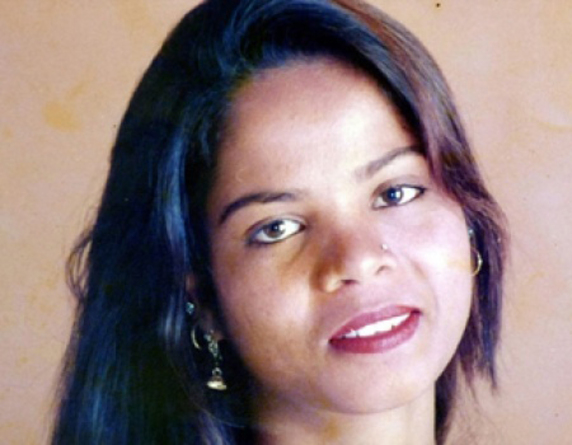Pakistan: new law will not help Asia Bibi
The Pakistan court that in October said Aasiya Noreen (Asia Bibi), a Christian, must die for the crime of insulting Islam, based its ruling on a legal technicality that it now wants to eliminate.
World Watch Monitor

The Lahore High Court, an appeals court for Pakistan’s largest province, decided that it would let stand the 2010 conviction of Aasiya, a day-labour berry picker whose argument with a Muslim co-worker blew up into a highly-charged test of the country’s anti-blasphemy laws. The appeals judges now explain they had no choice, given the way Pakistan’s laws are written, and have turned to lawmakers to craft legislation that would empower trial courts to apply a test that would make future blasphemy convictions much more difficult to achieve. That test was not in place when Aasiya was tried.
The High Court’s detailed legal reasoning, as well as its intention to close the loophole through which it says Aasiya has fallen, is contained in a written decision that was not available when the court ruled from the bench that her original conviction will stand. In Pakistan, blasphemy against Mohammed, the prophet of Islam, carries the requirement of the death penalty, though it has never been carried out.
Legal glitch
‘The bench has referred the case to the executive for consideration after identifying a legal glitch’, said Abid Saqi, former President of Lahore High Court Bar Association.
That glitch, he said, involves a legal principle found in Islamic law called tazkiya al shuhood. It requires accusers to meet strict standards of Islamic piety, and it came into play when Aasiya’s lawyer, Naeem Shakir, embarked on an unconventional legal strategy: to attempt to subject his client to Islamic law rather than Pakistan’s secular laws.
Pakistan’s Federal Shariat Court, which determines whether the country’s laws comply with the principles of Islam, declared in 1990 that insulting the prophet qualifies as hadd – a category of crimes and punishments prescribed in the Qur’an and the tradition of the Prophet. Accordingly, the only acceptable penalty is death, the Shariat Court ruled.
And that, in turn, requires the strictest standards of evidence, or tazkiya al shuhood, Shakir argued to the Lahore High Court in October. He pointed to a 1992 decision by the Pakistan Supreme Court, which ruled that ‘[w]hat the expression tazkiya al shuhood signifies is to require elaborate enquiry into the piety, uprightness and integrity of the witness from the men of the same virtues’.
Those stringent barriers were not used at Aasiya’s 2010 court trial, rendering the conviction invalid, Shakir argued.
Prevailed by default
In their written ruling, High Court judges Muhammad Anwaarul Haq and Syed Shahbaz Ali Rizvi upheld Aasiya’s conviction and death penalty based largely on a shoddy trial defence that failed to cross-examine prosecution witnesses. Left unchallenged, the prosecution’s case prevailed by default, the appeals judges said.
Aasiya’s trial lawyer, S.K. Chaudhry, who also was present at the appeal hearing, had previously said he dared not speak the allegedly blasphemous remarks to Aasiya’s accusers in court, lest he be accused of blasphemy himself.
The High Court’s ruling brushed aside the 1992 Supreme Court guidance on tazkiya al shuhood, saying the accused in that case had been acquitted on the merits of the evidence even without the benefit of the stricter standards, leaving open the question of whether those standards ought to be employed generally.
The ruling was silent on the question of hadd in Aasiya’s case and whether the attendant higher legal barriers to prosecution ought to have been employed. The judges did, however, suggest that they could have made a determination if they had been equipped with guidelines for applying the legal test:
‘In the absence of any corresponding amendment in procedural law for testing credibility of a witness at such a higher standard, the principle of tazkiya al shuhood can-not be applied in other cases’, the ruling said. It expressed the ‘utmost necessity for necessary corresponding amendments in procedural law for the proof of an offence where only sentence provided is death’.
The judges ordered that the Ministry of Law, Justice and Human Rights transmit the court’s request to the Pakistan Government.
If the government complies with the High Court’s request – a separate matter entirely – blasphemy defendants in Pakistan theoretically could place nearly insurmountable barriers in front of accusers.
Placing the matter in the hands of Pakistan lawmakers opens the possibility of renewed public debate over an extremely sensitive issue for the country.
Politicians have been killed for speaking out in favour of reform. In 2010, two politicians were killed for speaking out in favour of Aasiya Noreen.

